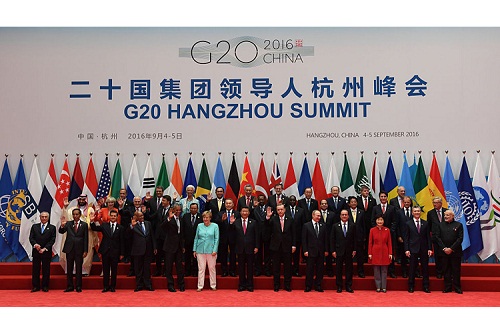By Gautam Mukherjee
- America may have a better perspective on China than China itself. President Barack Obama called it a ‘middle-income economy,’ with ‘mercantilist’, self-advantaging ideas, that need changing.This was in an interview with Indian-American journalist Farid Zakaria, on the eve of the G20 summit at Hangzhou. And prior to the next pyramiding at Laos coming up.
This was President Obama’s last scheduled official visit to Asia before the end of his presidency.
Making his words count, Obama intoned his oft repeated mantra, that with increasing power, comes increasing responsibility, and that it was incumbent on a responsible country to respect the rule of international law. It was also necessary for durable international trade, for both sides to gain, and be able to see their relative advantages.
He pointed out that America, (as the paramount military power), did not have to uphold international law, but does so, to keep the world in order and harmony.
This, notwithstanding its historical tendency to pre-empt and meddle wherever it sees fit, its dodgy record with the Islamic State terror group, and indeed the cosiness of G2 with China at the beginning of the Obama presidency.
In the specific context of South China Sea, Obama suggested that China could not flout the decision of the Arbitral Tribunal, which has a UN mandate, nation, at the Hague, just because it had found in favour of the much smaller and militarily weaker nation, the Philippines.
Obama may well have articulated what is on the mind of other countries in the littoral, such as Vietnam, Japan, Taiwan — and India, for that matter. After all, what the US can get away with, is not what China can.
That Prime Minister Narendra Modi visited Vietnam to sign a slew of defence, oil and other pacts just before going to Hangzhou, a visit by an Indian Prime Minister after 15 years, underlines the shifting emphases.
India has also been increasing its military support to Afghanistan, with tacit US approval, growing into its broader responsibilities, as a counter-weight, that will, more cogently, include the Indian Ocean going forward.
India, in a 35-minute meeting between Prime Minister Modi and President Xi Jinping, reiterated its concerns, now backed by the US.
These include the China Pakistan /economic Corridor (CPEC) going through Pakistan-occupied Kashmir/Gilgit-Baltistan, and Balochistan; India’s NSG bid blocked at Seoul, chronic cross-border terrorism from China’s all-weather friend, the stymied UN declaration of JeM chief Masood Azhar as a wanted terrorist, and China’s own frequent transgressions on the Line of Actual Control.
Modi blandly said it was important to be sensitive to each-other’s aspirations. China, on its part, asserted that ‘hard won’ understandings with India needed to be taken forward.
But all this, of course, is standard diplomatese. What is different in the Hangzhou exchange, however, is India’s firm stance, its push-back, that has challenged the constant China/Pakistan narrative.
India recently beefed up its security at Ladakh, with over 100 tanks, overruling China’s malafide objections; and likewise in the North-East, with airports, road, and rail being made made functional, and BrahMos missiles stationed already.
It has also obliquely put Pakistan/China on notice, both in PoK/Gilgit-Baltistan, asserting it plainly to be Indian territory.And in Balochistan, openly backing the Balochi bid for independence from Pakistan.
Both of these policy initiatives have received enthusiastic responses from the people of the respective regions, and their diaspora abroad. India has also restarted its Balochi service on Air India Radio.
This meeting has come just after the signing of LEMOA with the US, as part of a burgeoning defence partnership.
The support of the others in the UNSC, including old friend Russia, not only to India’s own UNSC bid, also implies further military support from NATO/ANZACS.America and Japan renewed their assertion that India is a force for non-proliferation, and needs to be included in the NSG and before the end of the year. China now admits to being ‘cornered’ on this, but it remains to be seen how the situation plays out.
China has, for example, deployed its stealth bombers in the Tibet theatre, after warning India, prior to the Hangzhou summit. It has also quickly announced a defence pact of its own with Pakistan, after India’s LEMOA success.
In the broader G20, India has raised the issue of international terrorism strongly. It tends to do so at almost every forum it attends now, and a consensus is definitely building towards combating the menace multilaterally.Similarly, another bugle call that is increasingly resonating everywhere, is on the matter of illicit funds – from corruption, drugs, gun-running, smuggling, extortion, etc. moving around/hiding in tax havens, morphing across international financial systems.
Apart from this money’s unsavoury origins, its mostly tax-evaded configuration, it sometimes is yet another vital adjunct to the bloody business of international terror – its financial lifeline.
And, in the midst of all this and other weighty talk on the global economy, there was no mention of the unrest in the Kashmir Valley at all.
(The writer is a senior commentator)
(The views expressed are the author's own and do not necessarily reflect the position of the organisation)

